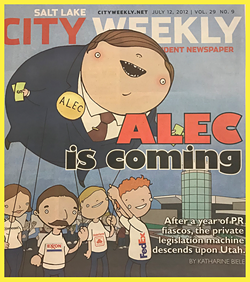By the end of City Weekly's 29th year, we had turned another corner.
"In two weeks' time, I'll be leaving the building as editor of City Weekly" wrote Jerre Wroble for the May 9 issue in 2013. "But before your mind drops down the rabbit hole of, 'Yet another journalism defector, another sign of the end,' rest assured, it's not that dire. After a decade at City Weekly, and four years as editor, it's just time for a change."
Leaving Scott Renshaw, Stephen Dark and Rachel Piper to take up the editorial reins, Wroble expressed pride for the human touch that City Weekly offered in contrast to larger, impersonal media organizations.
"If you phone or stop by our offices, you'll likely speak with Elly Green, stationed at our front desk," she wrote. "If you have an advertising question or issue, you can speak to a real human being: Andy Sutcliffe, our general manager, or Jennifer Van Grevenhof, our ad manager. Need a copy of an invoice sent to you? Ask for Cody Winget. Want to request a newspaper rack for your shop? Phone Larry Carter." These and other members of the CW family—including digital editor Bill Frost, reporters Eric Peterson and Austen Diamond, blogger Colin Wolf and proofreaders Kolbie Stonehocker and John Paul Brophy—ensured dedication and heart in all areas of the paper's operations.
"Do keep reading," Wroble concluded, "The best is yet to come."
Wroble's exhortation was a needed round-off to a busy year of reporting, a year that was itself full of bends and turns—and not very encouraging ones at that.
The stupidity and spleen of the 2012 presidential election were widespread, as was fear-mongering over the Affordable Care Act. A reactionary Legislature hunkered down with measures on guns, public lands, voter ID laws and downsizing the Radiation Control Board, stacking it with members friendly to mining, fuel and manufacturing.
Our chunky, adulterated air was enough of a concern that the state introduced a color-coded air quality system and the notion—which physicians criticized—that pollution was more OK for certain age groups than others. Not only was the air being poisoned, but the lands and waters as well, as with an oil spray in Woods Cross and a Chevron oil spill in Willard Bay.
The shooting at Connecticut's Sandy Hook Elementary shocked the nation and renewed debate over assault weapons, causing most of Utah's sheriffs to lose their collective minds in protest. Speaking of questionable priorities, the Nexstar company took over ABC4 and fired at least 15 staffers right before Christmas, and scandal arose over the alleged role that Attorney General John Swallow played in businessman Jeremy Johnson's attempt to bribe his way out of a Federal Trade Commission probe.
Other stories provided intriguing turns to the restless soul. Stephen Dark's stories were varied and insightful, writing on the incarcerated mentally ill as well as a questionable audit initiated by Lt. Gov. Greg Bell. Carolyn Campbell lent a humane look at the life of an exotic dancer, Steven Rosenfeld provided a history of the National Rifle Association and Eric Peterson wrote a firsthand account of a local man shot down by police in front of the City Weekly offices after threatening to detonate a bomb. This year also saw the debut of our website's ticket store and tributes to deceased locals such as lawyer Brian Barnard, educator/journalist Milton Hollstein (1926-2012) and ex-cop/CW music blogger Lane Heaps (1961-2012).
Remembering Vol. 29: In the shadows
"It was all pretty funny double-agent play until Feb. 26, 2012, when Trayvon Martin was killed," wrote Katharine Biele on May 23. "That's when the American Legislative Exchange Council (ALEC) blipped onto the national radar, big time. The death of that young, hooded black man by neighborhood-watch volunteer George Zimmerman brought Florida's 'Stand Your Ground' law to light, and with it the people and corporations who helped shepherd it to passage."
Touting itself as a nonpartisan organization of state legislators "that favors federalism and conservative public-policy solutions," ALEC had been identified with 800 pieces of legislation modeled by corporations, from vouchers and health care to immigration, private prisons and public safety. Founded in 1973 by conservative Paul Weyrich (of Heritage Foundation fame), ALEC developed task forces to operate as lone think tanks, calling for input from corporations like AT&T and Koch companies.
"We've been trying to get the state to pull out of these organizations forever," Claire Geddes said of ALEC for Biele's July 11 story. "Our government has gone so far wrong that they believe this is right—and it's fascism. Everyone talks about socialism, but we're promoting corporations above the individual, and people ought to be horrified."
"Instead," Biele reported, "Utah has put out the welcome mat for ALEC, which is holding its 39th-annual meeting in Salt Lake City from July 25 to July 28." Held at the Grand America, Gov. Gary Herbert greeted attendees inside while protesters gathered outside. Veterans for Peace organizer Aaron Davis gave a crash-course on ALEC, an anti-ALEC conference by Alliance for a Better Utah was held a block away, street theater skits were staged in opposition to the convention, and an ALEC Critical Mass Bike Swarm descended upon the event.
"The Empty Plate Banquet was perhaps the most poignant protest," wrote Clee Paul Ames in a Sept. 20 letter. "While the ALEC crowd of corporate dignitaries, GOP legislators of Utah and lobbyists dined in a five-star-hotel's dining rooms, protesters held the Empty Plate Banquet outside, where empty plates at tables symbolized the increasing poverty among the shrinking middle class and growing poor across America, largely due to the policies authored and implemented by those dining in posh splendor."
Providing "off-the-shelf" legislation, ALEC facilitated states offering up laws as a template for others. Responsible for "stand your ground" laws, limiting or outright abolishing parole, voter ID laws, "right to work" measures and penalties for animal activism, the organization found an early champion in Utah with former state Sen. William "Bill" Barton, who viewed the organization as in keeping with the purpose of the American founding, as he conceived it: "People in search of profit."
Amid worries that legislation was being manufactured by a private organization like ALEC, state Rep. Ken Ivory dismissed the fears as "ridiculous," saying that whatever the origins of a bill, it still needed to go through a public process to be passed. For Ivory, the organization was a meeting of shared interests, lighted by the glow of a "states' rights" federalism. "And yet ALEC's influence is indisputable, its motivations suspect," Biele replied. "Ivory draws a straight line from the model legislation of ALEC to the halls of the Capitol; he's apparently not enough of a conspiracy theorist to see all the arterial paths."
In September 2021, ALEC returned to Salt Lake City for its 48th annual meeting, wherein Gov. Spencer Cox extolled the virtues of "the Utah Way."
In time
Whether interviewing Pete Funaro of Diamond Lil's, Kamas Theater owners Kevin and Sheree Harris or Sonya Richins of Save the Wild Mustangs, the "Five Spot" served as an enlightening look into the works and words of Utah's diverse denizens.
Among many notable interviews was one conducted by Kolbie Stonehocker with historian John McCormick for the Sept. 20 issue of 2012. With John Sillito, McCormick co-authored A History of Utah Radicalism the previous year and had been lecturing on the subject at the University of Utah.
"If you ask somebody in 1910 whether they [were] aware that there were socialists in Utah who were running for office and being elected to office, holding regular meetings on street corners and at Liberty Park, etc., they would say 'yes,'" McCormick explained. "If you ask people today, they usually say 'no.'" He called this "disappearing knowledge," a phenomenon which warps the view history as the vital details of the past die out with those who lived them.
Tracing Utah's radicalism from the Mormon pioneers—whom McCormick deemed "utopian socialists" for their communitarian practices—to the state's socialist and communist parties of the early 20th century and the social democratic and Occupy movements, he posited a multifaceted state with a future that was hardly set in stone.
"Utah right now is very conservative," he said. "People oversimplify not only Utah's present, but past. Utah has always been a very complex place. It's never been the story of one people and one point of view. ... If you think of it as complex in the past, that leads you to a different conclusion about the present and future than if you think about it as [a] relatively uncomplicated place."
More by Wes Long
-
40 Years of City Weekly—Volume 36: 2019 to 2020
City Weekly Rewind
- Apr 24, 2024
-
40 Years of City Weekly—Volume 35: 2018 to 2019
City Weekly Rewind
- Apr 17, 2024
-
Salt Lake's modern tree canopy is a living legacy of the peoples of Utah.
Life in the Slow Lane
- Apr 17, 2024
- More »







